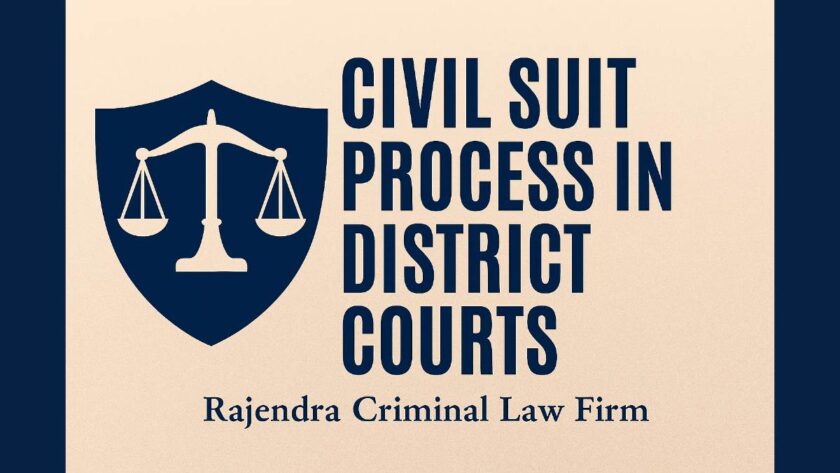Civil disputes arise in many aspects of life. People face issues related to property, contracts, family matters, business disputes, and compensation claims. When these disputes cannot be resolved amicably, they are brought to court. District courts in India handle most civil matters at the first level. Filing a civil suit process in a district court involves a clear legal process. It requires patience, understanding of law, and strategic planning. At Rajendra Criminal Law Firm, we guide clients through the civil suit process and help achieve favorable outcomes.
Civil Suit Process in District Courts – How Long, How Hard, How to Win – Legal Consultant: Rajendra Criminal Law Firm
Understanding Civil Suits
A civil suit is a legal action where one party claims a right or seeks compensation from another. The aim is to enforce legal rights or obtain remedies under civil law. Civil law differs from criminal law because it does not punish but provides relief to the aggrieved party.
Civil suits are filed under the Code of Civil Procedure, 1908. Common types include suits for recovery of money, property disputes, injunctions, specific performance of contracts, and damages for breach of contract. Each type of suit has unique requirements and legal remedies.
Filing a Civil Suit
The process starts with drafting a plaint. A plaint is a formal written complaint submitted to the court. It must include the parties’ details, facts of the dispute, cause of action, and relief sought. Proper drafting is crucial because the court examines it to decide whether to admit the suit.
Once the plaint is filed, the court issues a summons to the defendant. The defendant must respond by filing a written statement. The written statement includes the defendant’s version of facts and any defenses or objections. Failure to respond may lead to the court proceeding ex parte, which means the case proceeds without the defendant.
Court Procedures and Hearings
After filing, the court schedules hearings. The process involves several steps including admission of documents, framing of issues, evidence collection, and arguments. During evidence collection, parties present documents, witnesses, and expert reports to support their claims. Cross-examination of witnesses is a critical stage where weaknesses in the opponent’s case can be exposed.
Framing of issues is an important step. The court identifies specific points of dispute that need to be decided. The issues guide the direction of evidence and arguments. This helps the court focus on essential questions and avoid unnecessary delays.
Duration of Civil Suits
Civil suits in district courts can take months or years. The duration depends on factors such as case complexity, number of parties, availability of evidence, and court workload. Simple cases like money recovery may conclude in months. Complex cases involving property disputes or injunctions may take several years.
Court adjournments, delays in filing evidence, or absentee witnesses can extend the process. Efficient preparation and timely submissions can reduce delays. Legal experts play a crucial role in managing timelines and ensuring compliance with procedural requirements.
Challenges in Civil Suits
Civil litigation is often demanding. Some challenges include procedural delays, complex legal arguments, conflicting evidence, and tactical maneuvers by opponents. Additionally, improper drafting of plaints or written statements may result in dismissal or prolonged hearings.
Managing multiple hearings and coordinating witnesses requires attention and discipline. Missteps can weaken the case and reduce chances of success. Therefore, careful planning, documentation, and strategy are essential.
Strategies to Win Civil Suits
Winning a civil suit requires a combination of legal knowledge, evidence, and strategy. Clear documentation is key. Collect all relevant agreements, receipts, correspondence, and legal notices. Organize them chronologically and ensure authenticity.
Presenting credible witnesses strengthens the case. Expert testimony in technical matters such as property valuation or contract interpretation can provide a competitive advantage. Lawyers must prepare thoroughly for cross-examination and anticipate the opponent’s arguments.
Legal arguments must focus on facts, law, and precedent. Highlight strengths and counter weaknesses effectively. Avoid unnecessary disputes and focus on issues framed by the court. Proper advocacy increases chances of obtaining favorable judgments.
Role of Legal Consultants
Legal consultants and advocates guide clients through procedural complexities. They draft legal documents, manage court submissions, and provide strategic advice. Consultants ensure that deadlines are met, evidence is properly presented, and arguments are persuasive.
At Rajendra Criminal Law Firm, we specialize in civil litigation. Our team assists clients in drafting plaints, filing written statements, collecting evidence, and preparing for hearings. We aim to simplify complex procedures and maximize the likelihood of success.
Importance of Documentation and Evidence
Evidence forms the backbone of civil litigation. Courts rely on credible and verifiable documents. These may include property papers, contracts, emails, financial statements, and expert reports. Timely submission and proper authentication are critical.
Witnesses must be well-prepared. Their statements should corroborate documents and support legal arguments. Any discrepancies or contradictions can weaken the case. Therefore, careful preparation and coordination with legal experts is necessary.
Frequently Asked Questions
A civil suit is a legal proceeding where one party seeks enforcement of rights or remedies from another under civil law. Common types include property disputes, contract breaches, money recovery, and injunctions. Civil suits are governed by the Code of Civil Procedure, 1908, and aim to provide relief rather than punishment.
The duration varies depending on case complexity, number of parties, evidence, and court workload. Simple cases may conclude within months, while complex property or contract disputes can take several years. Timely filing of documents, coordinated witnesses, and strategic legal representation can help reduce delays.
The process begins with filing a plaint, followed by the court issuing summons to the defendant. The defendant files a written statement. Then, the court frames issues, admits evidence, conducts witness examination, and allows cross-examination. Finally, arguments are heard before the court delivers a judgment based on facts, law, and evidence presented.
Winning requires clear documentation, credible witnesses, expert reports if needed, and strong legal arguments. Proper drafting of plaints and written statements, timely submissions, and focusing on issues framed by the court enhance the likelihood of a favorable judgment. Coordination with legal experts ensures a coherent strategy.
Legal consultants guide clients through complex procedures, help draft documents, manage submissions, and provide strategic advice. They ensure compliance with deadlines, proper presentation of evidence, and persuasive advocacy. Expert representation improves efficiency and increases the probability of success in court proceedings.
Conclusion
Civil suits in district courts involve multiple steps, from drafting plaints to presenting evidence and arguments. The process can be long and challenging but is manageable with proper guidance. Success depends on thorough preparation, strategic planning, and effective legal representation.
At Rajendra Criminal Law Firm, we help clients navigate civil litigation efficiently. We focus on minimizing delays, organizing evidence, and presenting strong legal arguments. With expert guidance, parties can pursue justice, enforce rights, and achieve favorable outcomes.
Civil litigation may be demanding, but with careful strategy, preparation, and professional support, winning a civil suit becomes achievable. Proper legal consultation ensures clarity, compliance, and confidence throughout the judicial process.
Read More
- Fast Track Courts for Rape and POCSO: What the Accused and Victims Must Know
- How to Win a Criminal Trial in Sessions Court – Defence Tactics Revealed
- How to Get Police Protection Orders from Madras High Court
- Recent Criminal Appeals Allowed by the Madras High Court – 2025 Review
- Writ Petition vs Criminal Revision: What to File in Madras High Court and When?
- Legislative Department – Ministry of Law and Justice





